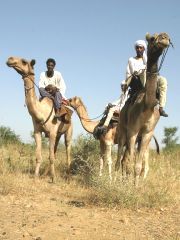UN: Rapists, killers free from arrest in Sudan
By Evelyn Leopold
UNITED NATIONS, Feb 7 (Reuters) – Sudan refused to arrest those responsible for atrocities in Darfur, and rebels intensified attacks against police forces, U.N. Secretary-General Kofi Annan said on Monday.

|
|
Members of the Um Jalool, an Arab nomadic tribe alleged to be part of the Janjaweed militia, ride their camels 20 kilometers outside the village of Muhkjar in West Darfur, October 2004. Musa Hilal the self proclaimed Nazir, or leader, of the Um Jalool tribe is the alleged coordinator of the militia known as the Janjaweed. (HRW). |
In a six-month review of the Darfur crisis, Annan, in a report to the U.N. Security Council, said the government implemented some promised measures but ignored others and instituted a “road-clearance” project that wiped out villages in an attempt to retaliate against armed rebels.
The report was issued on the eve of a Security Council meeting on Tuesday at which Ali Osman Mohammed Taha, Sudan’s vice president, and John Garang, head of the main southern Sudanese rebel group, are to brief members about their landmark north-south agreement signed last month to end a two-decade old civil war.
Annan said he was investigating how a planned U.N. peacekeeping mission in the South could help the African Union, which is monitoring the Darfur crisis. But he stopped short of recommending the peacekeepers go to Darfur, which would require Khartoum’s permission.
“The last six months have seen a substantial increase in lawlessness, in particular banditry and abduction, which have dramatically increased since October,” said the report.
“Fighting on the ground continues, and those responsible for atrocious crimes on a passive scale go unpunished. Militias continue to attack, claiming they are not part of any agreement. The government has not stopped them.”
2 MILLION HOMELESS
Pro-government militia have raped, killed and looted, making 2 million people homeless in Darfur, with no end in sight. Rebels are accused of looting humanitarian convoys and attacking government officials and police in a quest for more territory in the violence that began more than two years ago.
On hand for Tuesday’s meeting will be Charles Snyder, the State Department’s lead negotiator on Sudan, and Pierre-Richard Prosper, the U.S. ambassador-at-large for war crimes.
Prosper is lobbying council members to have the Sudanese accused of atrocities tried in a court in Tanzania, rather than the European-preferred International Criminal Court, which the Bush administration opposes.
The United States intends to pick up “a significant share of the costs,” a senior U.S. officials said. But Prosper’s presence could prove embarrassing for Taha, whose government has said no Sudanese would go on trial outside the country.
In anticipation of the meeting, the United States distributed “elements” of a resolution to the 15 council members. It would create a committee to decide which Sudanese officials, militia and rebels members should be put under a travel ban and have their assets frozen abroad.
In addition, the draft resolution seeks an arms embargo on Darfur and again threatens an oil embargo but does not call for it to be instituted.
The draft, when completed, will not designate where perpetrators of atrocities would be tried until that issue is settled among council members.
Russia and China have argued against sanctions in the past. But all 15 council members, except for the United States and China, have signed or ratified the treaty creating the Hague-based International Criminal Court, a permanent court set up to try individuals for genocide, war crimes and massive human-rights abuses.
